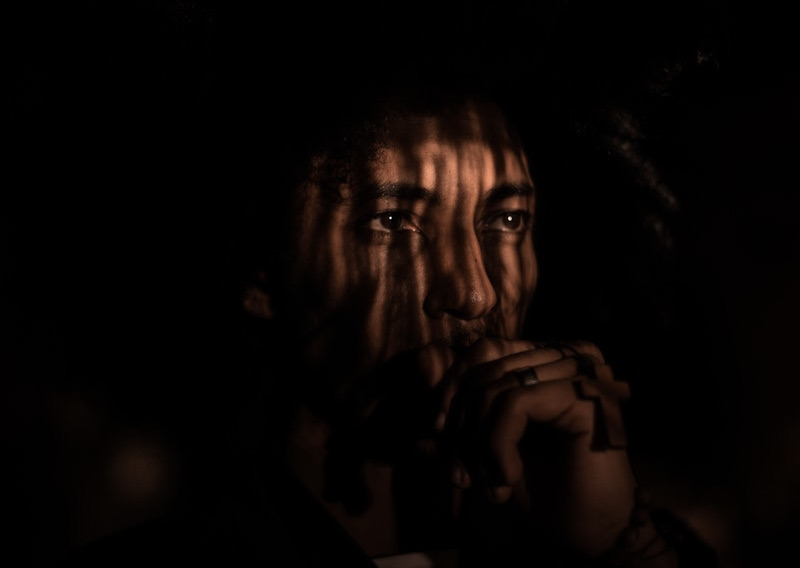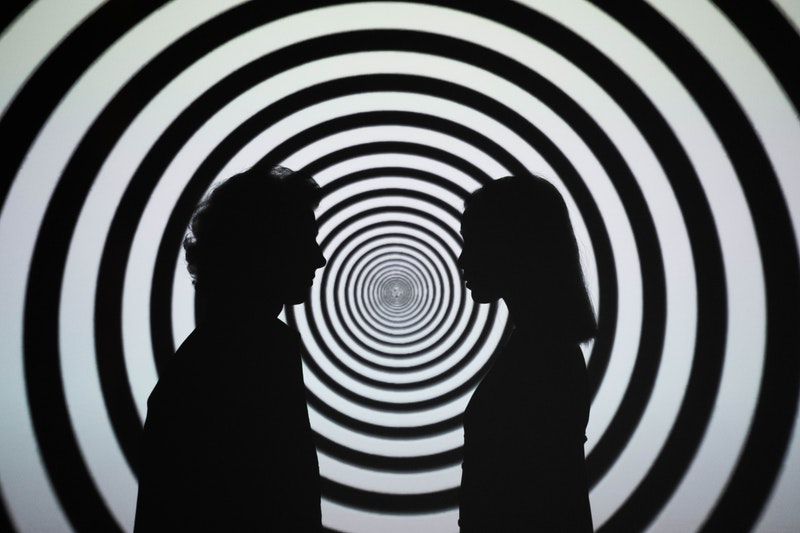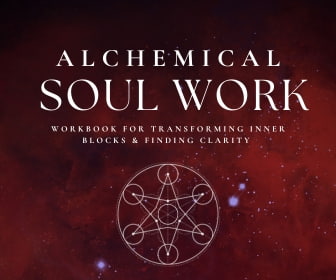On the surface of your life, everything is basically fine.
Perhaps you have a stable job, are relatively successful, have a decent income, a few children and pets, a spouse, and you live in a good neighborhood.
The only problem is that all this feels false.

Soul Work Compass Course:
Drifting through life without direction is exhausting. If you feel paralyzed by confusion or self-doubt, this course is your map out of the fog. We guide you safely through your inner darkness to uncover your true needs, values, beliefs, wounds, and sacred gift. Turn your confusion into crystal-clear direction and find your True North today.
Yes, you love your kids and your partner. But you can’t deny the fact that underneath it all, you feel hollow inside.
The walls around you that were once solid are now crumbling. And something within your gut is gnawing away at you like a rabid animal.
But what’s wrong with you? You’re middle-aged and should feel settled by now, right?
Enter: the midlife crisis.
As “cliche” as this term may sound, it carries rich depth and meaning which we’ll explore below. Get ready for the ride.
Table of contents
What is a Midlife Crisis?

A midlife crisis is a period of life, usually occurring between the ages of 45 to 65, in which a person feels fundamentally dissatisfied with their life and goes in search of more meaning and happiness. Coined by psychologist Elliot Jacque in the 1960s, the midlife crisis is fairly common, particularly in the western world.
Known in psychology as a ‘developmental crisis’ or existential crisis, in astrology as the Saturn return, and in spirituality as the Dark Night of the Soul, the mainstream culture refers to this death and rebirth period as a “midlife crisis” which is what we’ll refer to in this article.
Want to get LonerWolf at the top of your Google search results?
12 Signs and Symptoms of the Midlife Crisis

Let’s now examine some of the major thoughts, feelings, and experiences that accompany the midlife crisis. How many can you relate to?
- Fears of mortality – As your body begins to show signs of wear and tear, you realize that you ain’t a ‘spring chicken’ any longer. When you were a 20-something you were able to pretend that life was endless, but now you can’t. This increasing realization may trigger the next symptom:
- Asking deep questions about your life – You begin to ask questions that you perhaps avoided when you were younger such as, “What is the meaning of life?” “Is there life after death?” “What is my destiny or soul purpose?” “Is there more to life than just making money and running a family?”
- Feeling stuck and stagnant – You feel almost a sense of claustrophobia or being “shut in a box” that is hard to logically understand. Your ego has become overly solidified, hardened, stuck in its ways, and stranded in routines.
- You long for adventure – You want to break free, do something new, or be something new – anything to avoid that dreaded feeling of being static.
- Feeling depressed and anxious – You struggle to feel the motivation to do anything. Apathy fills you. Identifying what exactly is “wrong” with you or life becomes a preoccupation of yours. You don’t know what will bring you that sense of joy or being fulfilled anymore.
- Sense of disillusionment – As you reflect back on your life so far, you realize that nothing you’ve done has ultimately brought you the long-lasting peace, happiness, or fulfillment you’ve been searching for.
- You don’t know what your purpose is – What is your purpose or destiny in this life? Why are you here on earth? What’s the point? These are the types of questions that enter your mind.
- Time feels more precious – As you edge closer to your later years, you start to see time differently. You might feel remorse looking back on pursuits that now feel hollow. You’ll want to start spending your time doing activities and spending time with people that feel valuable.
- You’ll rethink your relationships – As time becomes more precious, you’ll think carefully about your close relationships. Do they bring you joy? Is there still a spark of love there? Do the significant others in your life fulfill your mental, emotional, or spiritual needs?
- You feel the impulse to do something, anything! – With the fears of wasting your life knowing that it’s now “half over,” you want to do something to get yourself out of that rut, out of the uncomfortable feelings you’re having. Perhaps you decide to purchase an expensive car, sell your house, or move to another country. Some of that stuckness might disappear, but a deeper craving still remains.
- Psychosomatic illness emerges – With all the stress you’re experiencing due to undergoing a crisis, you might experience strange illnesses that have no clear biological cause, but are instead triggered by your mental state. Examples of these psychosomatic illnesses include chronic fatigue, chronic pain, insomnia, headaches and migraines, and gastrointestinal issues.
- Your values start to shift or become more dominant – If you spent most of your life pursuing success, financial stability, or status, you’ll find these values dissolving as you reflect on how they never brought you what you truly wanted. If you value family, love, connection, and authentic living, these values will become more dominant, particularly if you never got a chance to fully immerse yourself in them.
Take a moment to reflect. Which one of these twelve points really hit you in the gut? What insights emerged as you read the above list? These thoughts and feelings are important and shouldn’t be ignored, I’ll explain why soon.
Midlife Crisis For a Man vs. Midlife Crisis For a Woman

Is there a difference between the way a man experiences the midlife crisis versus how women experience it?
Yes and no.
Midlife crisis for men often manifests in the following ways:
- Loss of sex drive (sometimes the opposite)
- Toxic comparison with other men regarding status, success, happiness
- Increase in impulsive decision making due to feeling trapped
- Feelings of numbness
Midlife crisis for women often manifests in the following ways:
- Becoming overly preoccupied with one’s looks or totally giving up and not caring
- Feelings of increased anxiety
- Inner emptiness (often due to kids leaving)
- Identity crisis or “who am I now?”
Keep in mind that it’s hard to have a clear line of delineation here: many women experience symptoms common to men, and vice versa. (As for those who don’t conform to the gender spectrum, there will likely be a mix of symptoms as well.)
Mostly, however, both men and women experience similar feelings of dissatisfaction and unhappiness.
The Deeper Meaning Underneath the Midlife Crisis

There is a crack, a crack in everything that’s how the light gets in.
– Leonard Cohen
There are many sources out there that advise you how to deal with a midlife crisis: “Don’t worry, it’s only temporary, it happens when you really need a change” “Talk to your therapist, they can prescribe medication if it gets really bad,” “Use it as a chance to purge your life, “Don’t worry about labels, go get that new house if it will make you feel better!”
While some of this advice can be really helpful and useful, I’ve rarely found spiritual resources out there that explore the soul-deep meaning of the midlife crisis.
Would you like to save this?
Your information will never be shared.
So what is the deeper meaning underneath the midlife crisis?
Quite simply, the midlife crisis is an archetypal call to adventure – a spiritual gateway into deeper communion with your heart and soul.
This crisis is an opportunity to reclaim your soul connection that has been suppressed through daily life and reconnect with who you truly are at a core level.
By facing the truth of your mortality, you’re called to ‘inscend,’ to step over the threshold of your ‘normal life’ and enter a new way of being.
Call of the Wild: The Three Crises

Before we explore how to actively embrace the opportunities presented by the midlife crisis, let’s rewind a little.
In our Western soul-suppressing societies, many of us experience the ‘call of the wild’ towards the spiritual journey through life, but most of us never truly hear or answer them.
The spiritual calling presents itself in many ways throughout our lives such as the death of loved ones, suicidal depressions, illnesses, near-death experiences, divorce, and so forth. But there are three main milestones that call to us the most loudly.
The first calling is what we modernly refer to as the “quarter-life crisis.” The quarter-life crisis happens in the first quarter of life: generally after we finish high school or university. At this time in our lives, we intuitively know that we need to “find” ourselves by leaving behind our family, friends, and hometowns. These people and places formed our juvenile identities as children and teenagers.
When I answered this calling, I remembered feeling intense fear and uncertainty. The religious belief system that my family had indoctrinated me into began to shatter, and my sense of identity dissolved. I didn’t know who I was, what was true and what was false, and where I was going in life. It was a traumatizing but deeply medicinal time that resulted in me separating from my family of origin. Saying goodbye to everyone and everything you love is a profoundly painful task.
The second great call of the wild presents itself as the “midlife crisis” – what we’re discussing in this article. This crisis may come in the form of an affair, a divorce, an illness, severe job unhappiness, an empty nest, lifeless relationships, ongoing life dissatisfaction, or the death of a parent. Ultimately, in my opinion, the midlife crisis comes at a moment when you’ve gathered enough wisdom to know that you’re not going to live forever.
Most people who experience midlife crises have spent their entire lives raising a family or working in a career. They haven’t had the time, or capacity, to ask the important questions in life. Eventually, something triggers the question, “Is this all there is?“
The third and final calling often comes as a deathbed crisis if we didn’t answer the previous two callings. The inevitability of imminent death creates such immense turmoil and ego distress, that the light of consciousness is finally permitted to shine through us. Many hospice workers can confirm this.
Although answering the deathbed crisis is “better late than never,” what a shame that so many people wait until their last moments to taste deep insight, soul connection, and peace. In fact, some people never experience this freedom at all.
We all have to accept our imminent death someday to live life more fully. The quarter-life, midlife, and deathbed crisis are all gateways through which we can access deeper fulfillment, meaning, joy, and spiritual expansion.
Now that you’re aware of these three crises, take a moment to reflect on how it makes you feel. What comes up for you when you consider your midlife crisis?
For over 12 years, we've poured our hearts into creating free content on this website. Unlike many platforms, we believe this guidance should be accessible to everyone. If this post empowered you in any way, please consider making a donation to keep us going. Any amount (one-time or ongoing) makes a huge difference.
Remember that anything and everything you feel is valid. And you’re welcome to share your reflections in the comments.
How to Be a Spiritual Alchemist and Accept the Call

You are not dead yet. It is not too late
To open your depths by plunging into them
And drink in the life
That reveals itself quietly there.
— Rainer Marie Rilke
Swiss psychiatrist and psychoanalyst Carl Jung is a powerful example of a ‘spiritual alchemist’ who transformed his midlife crisis into gold.
Right after his break from Sigmund Freud (his mentor and in many ways, surrogate father figure), he experienced a profound spiral into a crisis. After a series of bizarre and frightening dreams and visions, he began to wonder if he was going mad. Many of these dreams and visions are now available in posthumously published The Red Book or Liber Novus.
Instead of running away from or condemning what would otherwise be thought of as a psychotic break, Jung concluded that he was going through a kind of midlife crisis, and began exploring his unconscious mind. The result of this inscendence, this inner journeying, was mental, emotional, and spiritual renewal for Jung, and much of the work we have from him today.
To accept the call of the midlife crisis, to go soul searching, you need to first be open. You need to be willing to face what makes you uncomfortable slowly and steadily.
Here are some ways to find the gold within your crisis:
1. Learn the art of surrender
Without learning to let go and surrender to the process of death and rebirth, your midlife crisis will feel like nonstop a terrible ordeal. It’s much more beneficial to let go of the reigns – and this might mean taking a break from work, surrendering old responsibilities, and making space to take care of yourself.
Surrendering is extremely important for two additional reasons. Firstly, surrender allows you to let go of your former limiting self, e.g., all of your beliefs, ambitions, roles, and perceptions of how you were supposed to be. And secondly, surrendering allows you to embody your Soul, that is, all of your deepest longings, dreams, and wildest passions.
A few practices that can help you let go are mindfulness, meditation, writing letters to past facets of yourself and burning them, and even physically decluttering your environment.
Remember: breakdowns come before breakthroughs.
2. Journal about your experience
Journaling is a wonderfully simple way of processing everything you’re going through. If journaling intimidates you, try the freeflow or stream of consciousness method and write without editing or correcting yourself.
You might like to explore questions such as:
- When did your midlife crisis start (what came just before it)?
- What are you feeling right now?
- How are you practicing self-care in the face of this big change?
- What are your deepest values?
- What unlived parts of you would you like to now express?
- How can you be a lone wolf and walk your own path?
- What is the gold hidden in this crisis?
3. Find a mentor
As you walk into the heart of your midlife crisis, you will need to confide in others who are going through similar experiences.
This connection with others can bring a great sense of emotional alleviation and kinship, and you can find many online and local groups dedicated to inner awakenings. (For example, you’ll find a lot of kindred spirits on this website!)
Finding a trained counselor, life coach, or therapist will also be a great help for you, particularly if you’re struggling with feeling empty inside, anxious, or depressed.
4. Loneliness is normal – befriend yourself
Be prepared to experience loneliness as your old patterns, anchors, comforts, and even family or friends drift away. The healing balm for this is to learn how to practice self-love and befriend yourself.
Now is the ideal time to get to know yourself more. What do you truly like eating, watching, wearing, and doing? Ignore what others expect of you, what do you authentically crave?
Shed the old layers of self that keep you held back and allow yourself to blossom. If this process involves you taking yourself out for dinner every week, buying yourself flowers, going to that place you’ve always dreamed of, mastering that weird skill, or simply practicing kind self-talk, do it!
You might benefit from our Self-Love Journal during this self-befriending journey.
5. Find your spiritual path
Many people are rightfully suspicious of spirituality, especially if they had a dogmatic religious childhood.
But spirituality and religion aren’t the same things.
You can be spiritual but not religious. Furthermore, you can be a rational person, but also have a healthy respect for the great Mystery of life.
Many people who experience a midlife crisis don’t understand that it’s a call to deepen and go soul searching. In an attempt to try and satisfy their Soul’s craving for more depth, they go into addictions – or else splurge on a Ferrari, hook up with younger more beautiful people, or give in to the temptations of consumerist culture.
The midlife crisis is a period when the shadow self, the suppressed part of ourselves, comes out to be seen, healed, and transformed. But it can be easy to let it consume us – or else, totally ignore it and fight to hold onto some semblance of “normality.”
To find your spiritual path, something that will enrich you on a deep level, simply begin exploring. Start meditating each day. Go for walks and immerse yourself in nature. There are many ways to reconnect with life and yourself.
Here are some resources that you might find helpful:
- What is Spirituality? & How to Choose YOUR Path)
- How to Trust Your Intuition & Find Total Clarity (9 Tips)
- Spiritual Guidance: 11 Types & How to Find True Teachers
- How to Find Yourself When You’re Lost in Life (9 Steps)
This whole website is one big resource, so feel free to explore around!
Final Words

There comes a moment in our lives when we realize the truth of our mortality – this is the midlife crisis.
Although the midlife crisis is indeed painful and shattering, it is also a deep call from the Soul to start our spiritual journeys, find our true path, and reconnect with our True Nature.
As psychoanalyst James Hollis writes,

Stuck in the same old story?
Write a new one. The Alchemical Soul Work Workbook empowers you to become the alchemist of your own life. It provides the tools to dissolve old narratives and transform pain into power, giving you the freedom to create a future that is authentically yours.
In the second half of life, the questions become: ‘Who now, apart from the roles you play, are you? What does the soul ask of you? Do you have the wherewithal to shift course, deconstruct your painfully achieved identity, risking failure, marginalization and loss of collective approval?’
If you accept this call, as painful and challenging as it may be, renewed love, joy, and meaning lie ahead of you.
What is your experience with the midlife crisis? I’d love to hear below in the comments. Also, feel free to share this article with a friend if you think it might benefit them.
If you need more help, we offer 2 powerful ways to guide you on your inner journey:
1. The Soul Work Compass Course: Break free from feeling lost and disconnected. The Soul Work Compass is a practical 12-step course that transforms soul loss into soul clarity. Discover your core values, heal core wounds, and create a personalized compass to guide every decision you make.
2. The Inner Work Journal Bundle: Heal at the root. This Inner Work Journal Bundle guides you through self-love, inner child healing, and shadow integration with 150+ prompts and activities. You get editable digital files to use on any device or print unlimited times. Not for lukewarm seekers, these journals are for those ready to transform.

 $3
$3
I am 52 and can relate to the article on Midlife Crisis and most of the 12 Signs. My sticking point is item 1 – Fears of Mortality. I don’t fear my own mortality. In fact, I am more afraid of life/living than I am of death. I think part of me would be celebrating if I was told I had terminal cancer and only had a few months to live (no disrespect meant to those who are currently battling cancer – that’s just my view of my life at the moment). Mostly, I don’t like the world we live in and want to curl up in the foetal position and just withdraw from the world and wait for my death to come (and I wish it would hurry up and come!).
Wow, that’s heavy Josephyne, and at the same time I can totally understand. I feel that way about the world too sometimes and you know what’s helped me out? Having an information diet. I’m so careful about what I let into my mind space these days and I only check the news through Reddit’s “top stories” feature or other simplified stories (I never read the newspapers, watch TV news, or anything like that anymore). That’s my encouragement, to try and simplify and realize that a lot of what’s shared is sensationalized and deliberately focuses on the darkness/negativity to get more viewers.
I hope you feel better soon.
Josephyne, I often want to withdraw from the world too.
It’s easy to understand why. We live in a world disintegrating from the consequences of ignorant, immature human behavior. I call it the “dumpster fire” or “toxic stew” of humanity.
And we can’t escape. Because we are part of collective consciousness, we are each ingredients in the “stew” and manifested this together.
My particular emotional cocktail includes pain, fear, sadness, confusion, disgust, despair, and especially exhaustion. How do I not collapse from all this?
Many in the Lonerwolf community are also sensitives and/or have past trauma. That makes our feelings and responses even more complex and overwhelming. For example, I feel victimized by destructive human behaviors and powerless to stop the abuse. That’s connected to my childhood trauma.
Now you might be thinking, “Okay, thank you Mary Sunshine. So now what? What do I DO?”
In this continually evolving process, here are a few things that help me:
1. Accept your feelings and understand they are completely valid. I see why you want to “withdraw from the world.” It’s rough out there. Be careful not to gaslight yourself.
2. Take care of yourself. If this is challenging, like it is for me, start off with something small. (I try for a little extra sleep.) Because we are all steeped in the “stew,” even a tiny improvement feels like a lot.
3. I agree with Aletheia’s comment. I work in the communications field, and limiting my media exposure reduces my feelings of hopelessness.
4. Uncover (or revisit) your purpose. I believe we each deliberately incarnate with a purpose. Once you know why you are here, the “stew” is easier to bear. This site has super resources for exploring your purpose.
5. We are each spiritual beings having a human experience. We are far bigger than this one lifetime. That context/perspective eases my mind and heart.
Let me close by offering you an insight and thank you. You just made a positive impact on my life without even knowing it. I have never published deeply personal material online before. I was looking for a place to express my feelings, and you opened the door for me by posting here. Thank you Josephyne, and thank you Lonerwolf for providing this forum.
The eternal soul mission g home it hit me hard I m waiting foe my death to come till than I fake normality till normality will come and I still wait for my depart moment to come
Hi.
I can relate to the devastation of ones only child having such deep despair. My now 24 year old son well before we had a diagnosis of autism spectrum disorder was acutely aware of the spectre of death, it now inhibits his ability to ” Get on with” his life. We never had adequate support as a family to copes and it is a tremendous weight to bear the guilt and responsibility tha5 despite doing everything within our capacity he still looks at death as a way out of the problems that he has as yet not found soluti9ns to. I have always told him that there are solutions to every problem and it didn’t sink in I guess. Or my midlife crisis which began in his adolescence was a big influence. I’m still struggling through it. And now my hubby is entering his own. We are all in crisis it’s amazingly difficult. Yet I continue to seek the solutions.
Wow mid-life crisis, I was brought up with this saying from my parents, don’t get used to things because they dont last forever or we are only passing through we are not meant to be here for ever, don’t fear death because it walks with us every minute. I have cut all cords with people who were not good to me . Now Iam 59 years old accepted who Iam ,love myself and most of all I love being alone . I have always been a loner and continue to live life today and dont think about tomorrow is not yet here. I haven’t got the time to even think about mid life crisis. I feel satisfied with me myself and I.
May you find the strength, guidance, and support to get through this tricky time Melissa. I hope this resource has helped you ♡
I feel like I find myself in a mid life crisis even though I’m only 30 and somehow that makes me feel so lonely. I do have friends who feel the same as I do but they are all 40 and above. I do relate to them because we feel the same emptiness, depression/anxiety, disillusion, longing for the purpose of life etc but it’s like I ”shouldn’t” feel this already and everyone around me always tells me that I don’t feel or act my age, always feeling like an outsider.
Having two kids, a house and a husband living the ”normal” life. Being a CEO in a field were I can contribute to helping people in need (substance abuse and abused women) makes me feel like I have a good life, I do make a diffrence in the world and I am good at what I do but somehow I still feel empty, lost and unsatisfied.
Don’t really know why I’m writing this, I liked this post and it explained exactly how I feel at the moment and it helped me see the situation for what it is, a sort of deeper awakening than what has already occured…
Hi Molly, it definitely sounds as though you’re undergoing a quarter life crisis (more on that here: https://lonerwolf.com/quarter-life-crisis/). What you share does make sense and I’m glad this post could help you make more sense out of it. ♡
Hi Molly and Aletheia, I also started feeling the sense of mid-life crisis when I hit 30. It seems to be more like mid-life than a quarter-life crisis, since I started feeling like my life is over. Now at 35, I feel that I am basically living on bonus time. Due to the depression, I’ve gone through many rebirths in the last few years, letting go of so much and going through the kind of steps in the post. I’ve reached a place where I’m detached from everything but still appreciate and enjoy things. I live much more simply and slowly now, and I feel more connected to myself than ever before, which has helped with my physical health as well. It seems more like existential crisis – I’m not sure what the distinction is between quarter- and mid-life crisis. Thanks.
I’ve always been the spiritual type, always close close to nature, always seen the wisdom in it. Too many people confuse me, I certainly feel like a fish out of water in shopping malls and other unnatural surroundings.
And yet… though I have it all (nature and so on) I still feel there must be more. So last year in summer I decided to take an off-time and went on a hike with my horse. It was planned for three month. Unfortunately, my horse didn’t like the whole thing, being away from his mates and staying at different places every night. He got severely ill and I broke off the whole hike. (it was after that that I discovered your site, which has been a great help and I’m thankful for your work) But didn’t know what to do and still don’t. I’m back to work as I ran out of money, of course, but at 58, I’m none the wiser. Midlife crisis (three quarter life crisis) – yes, I’ve come to realize that I’ m not going to live forever, which up to then I had always believed. I’m running out of time. Is there anything useful for me left to do? And make a living off it, at best? Or do I have to keep working in jobs I don’t like, just to earn money?
And what about this crazy world we live in, have destroyed ever since I can think, we (the ecological movement of the 70ties and 80ties) have always fought against pollution and for ecological agriculture and it has all been in vain.
I just don’ t know. I just can’t find peace, seeing what’s going on worldwide and how nature is being exploited, still and still, just to make a whole lot of dollars for a few people and leave the earth devastated to our children and grandchildren. I think many people sense this, too, that’s why so many people suffer from depression.
It’s good you named it: There’s more than one midlife crisis, there’s at least two or three crises in your life.
But how to find peace, I still don’t know.
The ecological/world crisis we’re in definitely can add to that loss of peace, and I’m so glad you name that Sabine. I can’t speak for others, but I have found a certain relief on the Buddhist path with its emphasis on non-violence, letting go, and living in the moment. But I know that such a path won’t always resonate with everyone. All I can say is that I hear you and bear witness to your pain, as do the many others who come here. Being able to see that we share this pain collectively helps us to not feel so alone, or at least understood. Sending lots of love ♡
I started my mid life around 2016, I’m now in step 12. Life has really come together in alot of ways, making ways for things that really matter to be finally processed amongst all the suffering that has and continues to be an issue til you find the answers you’ve been needing all your life. The past rebirths the present as every new day.
Thanks for sharing Emilie <3
Hello Aletheia,
Great article and thank you. I’m here at 46 and wow…yeah….
Quarter life, I stood at the threshold between this life and the next….at a height I’d normally be terrified of but weirdly felt no fear… just the sureal peace and calm of the unknown abyss facing me like a calling home. A young couple came and sat down behind and to the right of me, distracting me long enough to give life another try. When I worked through the pain, became ‘ spiritual ‘ I met my now partner, late to most things in life, I became a 40 year old dad! Oh the absolute joy and the feeling of unconditional love only a new parent can understand, lit my light so brightly. Becoming a parent this late on is not easy and to boot I had to deal with my partners post natal depression and mine I guess! Our son was difficult from around 18 months and we couldn’t get the help we needed. Just comments like terrible twos…threes….fours…..goodness how long is this going to go on four….I researched everything Autism related etc. PDA was the closest I got.
Quarter life… here I am! My son at 5 told his teacher he didn’t want to be here and wanted to be dead! ( Later he’d tell me when I read him a bed time story , adding why is everyone so loud… everywhere we go everyone is so noisy! ). My World was destroyed….all the fixing I’d try to find out how to do couldn’t fix! Accompanied by a jumper off a big bridge on my way to work my emotional state was devastated. (The sea of flowers that followed…Big Dunc, you left a big hole read one of the cards). I’ve ( almost ) been the jumper! Don’t ever call someone who commits suicide a coward just count your blessings your life didn’t push you to knock on that door. It is a place of absolute desolate loneliness! You can’t connect to anything or anyone! But to take that final step takes a monumental leap of courage no coward could ever muster! Then as I parent my 5 year old wanted to end his life!!! Omg I can’t even describe what that feels like… devastation and total failure rolled into one! So you could say I got a glimpse of how it would feel if my own son had passed from this world and then the jumper! Six months later and ten sessions with an excellent therapist it’s getting better but I’m still no where near my light… working on it though. My son is now thriving…Thank-you God! His school have helped us in ways they can’t even comprehend and we’ve implemented some changed that have reaped huge benefits. He had his tonsils shrunk and adenoids removed due to sleep apnea, used to stop breathing for 13 seconds at a time.. turns out the rest of his woes were down to bad sleeping… took an amazing 20 something nurse called Lauren to work that one out in a few days, where other ‘seasoned’ professionals just wanted to refer him on! This has took a massive toll on me and my partner…. we’re not 5 percent away from Co-parenting. On my journey so far I was out…what I call walking it out! Basically long walks in nature and revisiting the ghosts. On this one walk near the sea where I live. I went through a subway at the end it opens out over a beautiful bay! At the end some withered flowers. I’ll let you draw your own conclusion but for me it’s a powerful and painful one. But on the wall next to me some graffiti drew my attention…
Love Wins! (With a smiley face below)….
Love wins! If I had crossed at the quarter life I’d never have met my partner and my son!
(Now on to the mid life wtf thank you Lonerwolf you are a light in the deep).
Wow SeanO, what a ride you’ve been on! You’re a testament to what can happen when you keep going – and I love that synchronious message you saw “Love Wins!” :-D Thank you so much for taking the time to share a little piece of you here!
Mid life Crisis
As we begin to feel our own mortality and shift gears mentally and emotionally understanding our aches and pains and body changes are part and parcel of the inevitable aging process, we slow down stop and think things through more and come to a major level of acceptance of home truths within ourselves and become more patient of self and forgiving of others.
All those things left unsaid or not completed come into focus as you recall both the great times and the bad ones too. So by clearance, meditation, journaling and in my case some hypnotherapy (light trance) all helps the Mid life crisis to be more acceptable and do able before we pass on.
“All those things left unsaid or not completed come into focus” – wow, this is a big one. I appreciate you sharing this and your experience John!
I can answer yes to six of these questions. It’s because of the pandemic and moving house going from living with someone to living on my own. This has bought back old trauma like when my dad died in the last house I moved into.
I hear you Heather, that must be quite tough for you. Thank you for reading and sharing your experience <3
This article really resonated with me because my beloved husband of 40 years passed away last year and I can relate to every one of the 12 signs and symptoms that you talk about here. It’s been a very hard road as anyone who has lost a loved one will know, but I am grateful to have found your website….I believe it was presented to me as a sign of my ‘Spiritual Awakening’. I find your articles both enlightening and comforting. Thank you for sharing all that you do.
I can’t imagine how hard that must have been (and still be) for you Susan. Thank you for your words. May you receive all the support and comfort you need. Much love ❤
I feel like I have been in mid-life crisis for the past year. Last February, I had spine repair surgery and have been on long road to recovery. On my road to recovery, I began my spiritual journey. I began to realize I had strong empath characteristics and a gift. I started exploring my spirituality with reading about spirituality and tarot cards. I draw daily tarot cards and try ro do moon cards during full moon or new moon. I have moved forward to working on my inner child and This of course has me thinking about my past life and where I am now.
Tarot cards are such a wonderful healing and supportive tool and I use them as well. They really help to get you grounded and oriented. (I’d be curious to hear what deck you favor!) Thank you for sharing about your road to recovery Stephanie, sending lots of love ♡